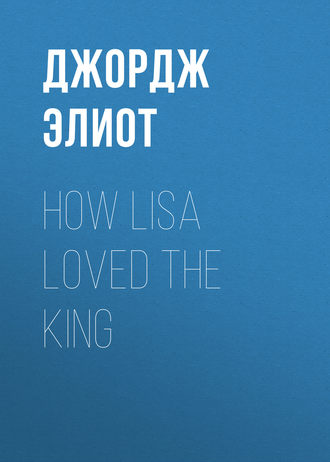полная версия

Джордж Элиот
How Lisa Loved the King
With gentle looks and speech, until a smile
As placid as a ray of early morn
On opening flower-cups o’er her lips was borne
When he had left her, and the tidings spread
Through all the town, how he had visited
The Tuscan trader’s daughter, who was sick,
Men said it was a royal deed, and catholic.
And Lisa? She no longer wished for death;
But as a poet, who sweet verses saith
Within his soul, and joys in music there,
Nor seeks another heaven, nor can bear
Disturbing pleasures, so was she content,
Breathing the life of grateful sentiment.
She thought no maid betrothed could be more blest;
For treasure must be valued by the test
Of highest excellence and rarity,
And her dear joy was best as best could be:
There seemed no other crown to her delight,
Now the high loved one saw her love aright.
Thus her soul thriving on that exquisite mood,
Spread like the May-time all its beauteous good
O’er the soft bloom of neck and arms and cheek,
And strengthened the sweet body, once so weak,
Until she rose and walked, and, like a bird
With sweetly rippling throat, she made her spring joys heard.
The king, when he the happy change had seen,
Trusted the ear of Constance, his fair queen,
With Lisa’s innocent secret, and conferred
How they should jointly, by their deed and word,
Honor this maiden’s love, which, like the prayer
Of loyal hermits, never thought to share
In what it gave. The queen had that chief grace
Of womanhood, a heart that can embrace
All goodness in another woman’s form;
And that same day, ere the sun lay too warm
On southern terraces, a messenger
Informed Bernardo that the royal pair
Would straightway visit him, and celebrate
Their gladness at his daughter’s happier state,
Which they were fain to see. Soon came the king
On horseback, with his barons, heralding
The advent of the queen in courtly state;
And all, descending at the garden gate,
Streamed with their feathers, velvet, and brocade,
Through the pleached alleys, till they, pausing, made
A lake of splendor ’mid the aloes gray;
When, meekly facing all their proud array,
The white-robed Lisa with her parents stood,
As some white dove before the gorgeous brood
Of dapple-breasted birds born by the Colchian flood.
The king and queen, by gracious looks and speech,
Encourage her, and thus their courtiers teach
How, this fair morning, they may courtliest be,
By making Lisa pass it happily.
And soon the ladies and the barons all
Draw her by turns, as at a festival
Made for her sake, to easy, gay discourse,
And compliment with looks and smiles enforce;
A joyous hum is heard the gardens round;
Soon there is Spanish dancing, and the sound
Of minstrel’s song, and autumn fruits are pluckt;
Till mindfully the king and queen conduct
Lisa apart to where a trellised shade
Made pleasant resting. Then King Pedro said,—
“Excellent maiden, that rich gift of love
Your heart hath made us hath a worth above
All royal treasures, nor is fitly met
Save when the grateful memory of deep debt
Lies still behind the outward honors done:
And as a sign that no oblivion
Shall overflood that faithful memory,
We while we live your cavalier will be;
Nor will we ever arm ourselves for fight,
Whether for struggle dire, or brief delight
Of warlike feigning, but we first will take
The colors you ordain, and for your sake
Charge the more bravely where your emblem is:
Nor will we claim from you an added bliss
To our sweet thoughts of you save one sole kiss.
But there still rests the outward honor meet
To mark your worthiness; and we entreat
That you will turn your ear to proffered vows
Of one who loves you, and would be your spouse
We must not wrong yourself and Sicily
By letting all your blooming years pass by
Unmated: you will give the world its due
From beauteous maiden, and become a matron true.”
Then Lisa, wrapt in virgin wonderment
At her ambitious love’s complete content,
Which left no further good for her to seek
Than love’s obedience, said, with accent meek,—
“Monsignor, I know well that were it known
To all the world how high my love had flown,
There would be few who would not deem me mad,
Or say my mind the falsest image had
Of my condition and your loftiness.
But Heaven has seen that for no moment’s space
Have I forgotten you to be the king,
Or me myself to be a lowly thing—
A little lark, enamoured of the sky,
That soared to sing, to break its breast, and die.
But, as you better know than I, the heart
In choosing chooseth not its own desert,
But that great merit which attracteth it:
’Tis law, I struggled, but I must submit,
And having seen a worth all worth above,
I loved you, love you, and shall always love.
But that doth mean, my will is ever yours,
Not only when your will my good insures,
But if it wrought me what the world calls harm:
Fire, wounds, would wear from your dear will a charm.
That you will be my knight is full content,
And for that kiss,—I pray, first, for the queen’s consent.”
Her answer, given with such firm gentleness,
Pleased the queen well, and made her hold no less
Of Lisa’s merit than the king had held.
And so, all cloudy threats of grief dispelled,
There was betrothal made that very morn
’Twixt Perdicone, youthful, brave, well-born,
And Lisa whom he loved; she loving well
The lot that from obedience befell.
The queen a rare betrothal ring on each
Bestowed, and other gems, with gracious speech.







